Orthodox churches can be found in all corners of the globe—even in far-flung Hawaii. This tropical paradise in the Pacific Ocean consisting of eight large islands and many more small ones is named after its largest island. It has a population is over one million, 60 percent of whom are Christian, including Orthodox Christian. Rector of the St. Juvenaly Orthodox Mission, Fr. John Schroedel, tells us about Orthodox life on the U.S.’s fiftieth state.
* * *
—Fr.
John, please tell us about the history of Orthodox
Christianity on the Hawaiian islands.
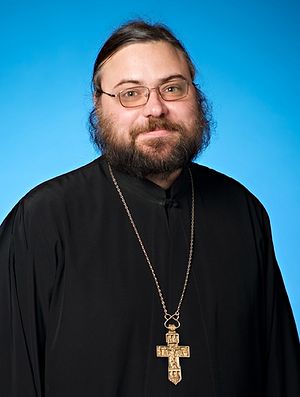
Fr. John Schroedel.
—Right now we have three churches and three priests. This one, the St. Juvenaly Mission on the big island of Hawaii, has only mission status. I have been here since December 4, 2007—not very long. This mission was formally started in 2004. There was a priest here, Fr. Sergius, who served for 18 months. After he left, there was no priest here for another 18 months, but the core community held on very stubbornly and kept meeting, having reader’s services and trying to obtain a priest. God bless them for their faith! When I came I could really feel that faith. They were hungry for Orthodoxy. Many of them had never regularly attended an Orthodox church before, so they wanted to gain experience and deepen their knowledge of Orthodoxy. As a young priest it is wonderful to be appreciated—just because you are a priest. They were eager to make up for their lack of experience, and worked hard to learn more. This was a great joy for me.
The other two Orthodox churches are located in Honolulu. One of them, a large Greek church dedicated to Sts. Constantine and Helen, is known as the Cathedral church of the Pacific. It is the oldest continuing church in the islands. There has been a Russian community here for a long time which has waxed and waned. The Greek parish community has been here since the 1950’s, and their current church building was consecrated in 1988. The current priest of that church, Fr. John Kuehnle, has been there for less than a few years.
Then there is the old Russian Synodal church. I say “old” in reference to the community; the building they use is just a strip-mall, office-style building, to which they only recently moved. But they have made it very cozy—it feels like a church in Russia, you can feel the ambiance. Father Anatoly Lyovin was a linguistics professor in the University of Hawaii, with a doctorate in Chinese and Japanese languages, and his wife is Japanese. He speaks I don’t know how many languages. That church, which is dedicated to the Iveron Mother of God, is also known for the myrrh-streaming icon of the Iveron Mother of God, about which you can find ample information on their website www.orthodoxhawaii.org. That icon was certified as miraculous by their ruling bishop, Archbishop Cyril of San Francisco, and travels around to other parishes of the world. It started streaming myrrh just after the reunion of the Russian Orthodox Church Abroad and the Moscow Patriarchate.
—Where there others missions on the islands?
Occasionally Fr. Anatoly would visit the big island of Hawaii, or the Greek community, who had a priest on Maui for a while. I think there was recently a service on Maui from the Greek church. Concerning Orthodox missions: the Greek church in Honolulu is called the Cathedral of the Pacific. We need a cathedral, because there are no Orthodox churches between here and New Zealand, and there is a need for a church in Polynesia. There are a lot of different sects that are very strong throughout the area—the Mormons and others. It seems to be a good time for real missionary work.
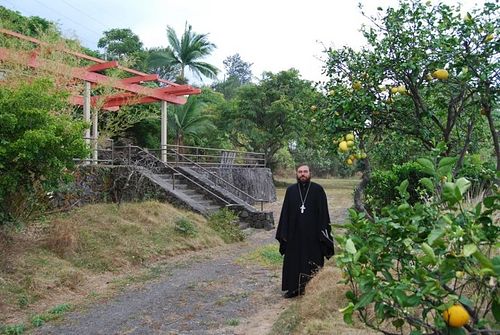 |
The history of the Russian community is really interesting too. The writings of an Episcopal bishop 1920’s say that the first Eucharist on Hawaii was Russian Orthodox Eucharist, if I remember correctly, on Pascha. A ship was sailing by the island just before Pascha, sometime between 1750 and 1793. The sailors said, “Let’s have Pascha on land, not on the ship”, and there was a bishop with them. Later on they had an alliance with the chief, King Kaumualii of Kaua’i. The king was fighting King Kamehemeha, whose name you can see all over the islands. King Kamehameha is famous here because he is the one who united all the Hawaiian islands. This island is called Hawaii; the whole state has the name Hawaii because of this island, since king Kamehameha conquered all the others. There was a Russian fort on Kaua’i—Fort Elisabeth, which is now a historical park. It was built during the time of this alliance, and the first Orthodox church in Hawaii was built there in 1815. The chief on Kaua’i was allied with this Russian leader who was probably with the Russian-American company. But the Russian government did not back him. He had plans to take all Hawaii, but because he had no backing and met no interest from the Russian government, he gave up, and Fort Elizabeth passed into the hands of the local authorities. Of course we can only speculate what would have happened if he had realized his plans! Perhaps Russians instead of Americans would be vacationing on Hawaii!
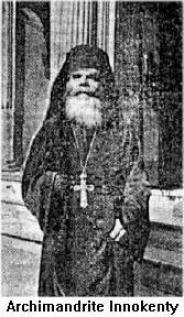 |
The last of these wasArchimandrite Innocent (Dronoff), who travelled all around South America and the islands in the 1930’s and 40’s looking for those Russians who were dispersed after the revolution. He was based in the town of Hilo, located on this island. There was a small church there in the 1930’s, mostly attended by Japanese people. He is buried somewhere near there, but no one knows where the church was or where his grave is. It would be interesting to find out. He is not a canonized saint, but we consider him the protector of our island, even though this mission is dedicated to St. Juvenaly of Alaska—the only canonical church dedicated to that saint, as far as I know. St. Juvenaly was one of the missionary monks who came to Alaska. Incidentally, St. Juvenaly used maps charted by Captain Cook!
—Tell us please about your path to Orthodoxy.
—I grew up in a Jewish neighborhood in Chicago. My mother is Jewish but I grew up Lutheran; however I was not very active in the church. The cultural environment around me was very materialistic. People mainly thought about money, or earthly things. As a child I felt the emptiness of all this, and so I went on a spiritual quest. I looked into all kinds of different religions. I really explored. First I investigated existentialist philosophy, and then I got into Buddhism, New Age religions—I even worked in a New Age bookstore for a while—and then I got to occultism. God had mercy on me; He knew I was looking for Him, only I didn’t know it! He took me to the right place and showed me the Truth. I had a Bible. I just started reading the Bible, and then started looking for a church. I went to all kinds of different churches. I would look them up in the phonebook. I would call and say “What you believe? What makes you different? I am so new to this, I have no idea.” The Jehovah’s witnesses gave me some books, and the Seventh Day Adventists said we worship on Saturday not Sunday, and so on. I went to all kinds of churches.
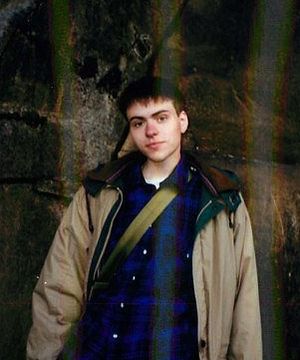
|
| John Schroedel in Jerusalem, 1994 . |
One of the monks there really made an impression me. He was a Greek monk. His English was rough, but understandable. He didn’t talk much though, he simply showed his life. His humility was tangible. When I was around him I felt convicted of my sins just because of his presence. We would ask him questions, such as how do you pray, how are you saved, and why did you become a monk? I remember his answers were so simple, very clear and deep. He spoke right from the heart. When we asked him why he became a monk he just said, “When you love somebody you want to be with him all the time.” That’s all he said! I think that experience raised my interest more than anything else. We as Protestants would come, not so much targeting the Orthodox, but wanting to bring life to what we thought was a "dead church". We thought it was bereft of spiritual life, and we just didn’t understand the reality. In the end, we encountered the rich depth of tradition that Orthodoxy has, and which we hadn’t known. It was a challenge.
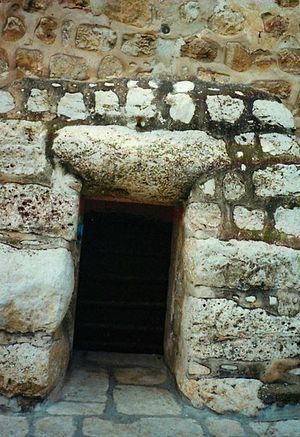 |
| The entrance to the Holy Cross Monastery in Jerusalem. Photo: John Schroedel, 1994 г. |
Anyway, I had a sense that that monk from Holy Cross Monastery is still praying for me, and I’m grateful. Now he is an archimandrite and the chief confessor for the church of the Holy Sepulcher. He is now a well-known spiritual father, Fr. Dionysios. I haven’t had any other contact with him, but I have seen a picture of him.
So, I went to Thailand, also as a Protestant missionary, and then came back to United States. My wife and I met in Hawaii with this missionary organization right before I left for Thailand, and in Honolulu we got engaged very quickly. Within a day we knew that were going to get married, but it took two months for us to become engaged, then it took another six months for us to get married. After our wedding we moved to Oregon to attend a Protestant Bible College. We were there for a year, but we almost immediately started going to the Orthodox Church. There was Greek Orthodox bookstore on the road where we lived, and we would go there even when it was closed. We would just look through the windows.
—Were you both interested in Orthodoxy?
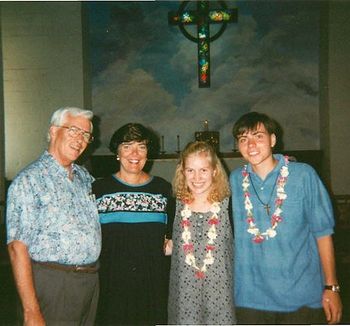
|
| In Hawaii, with his fiance in a Episcopalian church. 1995 г. |
—Was it was your own decision, or did someone suggest that you to go to seminary and become a priest? Maybe you felt something?
It is complicated. I think ideally, seminary should not just be the individual’s own desire. He needs to talk with his pastor or spiritual father, at least to ask for permission. I think it should also be a process of community discernment. It wasn’t just that I desired to be a priest, I had a calling… When I was a Protestant I was planning for full time ministry, so it was very natural for me to think about seminary, and not even necessarily to become a priest. The seminary just seemed like the natural place, and I thought, we would see after that… I went to increase my education, and because I had so much to learn. We all have so much to learn. But the priest in my home church was very encouraging, and the community was very encouraging. In fact, the priest was not only encouraging; he took me on, he got me involved, he was training me, involving me in parish ministry in many different ways. So those four years of mentoring were a key formation for me. I think I carried that with me. You see, the seminary doesn't solve everything; it mainly provides the academic study. One valuable thing about seminary is that it gives one a sense of the breadth of the Church, because people are coming from all over the world to that place to study, and therefore you see Orthodoxy from very broad perspective. You encounter so much more than you would in one local church. But often people come to seminary hoping for that kind of mentoring, and it’s a very hard environment for that to really happen. Maybe it depends on the person. I think that the teachers would like to provide more of it, but there is something about the structure, the demands placed on them that doesn’t allow for it. But I would say that besides the presence of everyone, the teaching, and of course the relationships one forms in seminary, the most formative thing is the liturgical cycle.
—It seems to me that seminary is kind of trial, a place where you can test yourself to see if you are ready to become a priest, or a monk.
Well, a lot comes out at seminary. I remember at my orientation there, Fr. Thomas Hopko said that they don't do this to us on purpose. But there is something about the experience of seminary that is a testing and a trial. It really brings things to the surface. They don't deliberately try to provoke us; it is perhaps God working through them.
—Tell us about your journey here, to Hawaii!
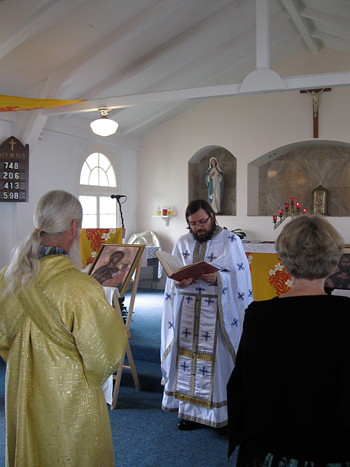 |
| Sunday services. |
The OCF was really a tremendous joy to me. We would usually meet once a week, sometimes more than that. At one time we were studying the church fathers on Monday, holding Vespers on Tuesday, and noonday prayers on Wednesday with study and a meal. It was really too much, but I was very zealous. But that remains a joy, and the student there were wonderful. I think that just having a group meant so much to the college students. College years are such an important time, because the students are now out of their families, they are beginning to make their own decisions about their life and faith, about how important their faith is to them. For many of them it is the first time they have had this experience of Orthodox difference. If they are Russians they never knew the Greeks, if they are Greeks they never knew about the Russians, Antiochians, or whomever. When you have people coming from different local Orthodox traditions, you see that the place of unity is Christ, and this strengthens one’s faith. There are various differences in cultural practices, but the thing binding people together is the faith. Some people wouldn't come because of that; it was not what they are interested in. But I think that it brought many people to life in a richer way. Many of them were already quite alive, and it was amazing to see how the formation they had received from their church communities or from the parents came out at college. I would see students come in who were already set in their faith, while others were really seeking. I really value that time, and I think that campus ministry is very important. I hope and pray for more full time staff members to reach out to our college campuses.
—That is an important thing, and I feel that we should organize the same thing in Russia.
I don’t know the situation in Russia with the colleges. Many of our colleges are far away from any churches, which is probably not the case in Russia. But college is such an important time, when people looking for reality. Where do they find reality? In the Church! That is all we have to offer. Their faith was always a joy that strengthened me.
Then there came a time when I was finished with coursework, and the people here had been without priest for 18 months, but they were looking and looking and looking. My wife and I had met in this Protestant missionary organization called YOM in Honolulu, so we already had experience in Hawaii. But also, about half of the core of group of people in this mission had been involved at some point with YOM, whose international headquarters is here in Kona. My godfather was overseeing the mission here temporarily. He would come and visit few times a year to keep the community on track and watch over them. He knew that I was at this place in my life where I could make such a transition. He also knew about my former connection with YOM, which is significant if only because I can speak their language, I can translate. Many of the people here are very new to Orthodoxy; they have never been through a full liturgical year. I think it's been a helpful connection.
—And
what is the schedule of services in your church?
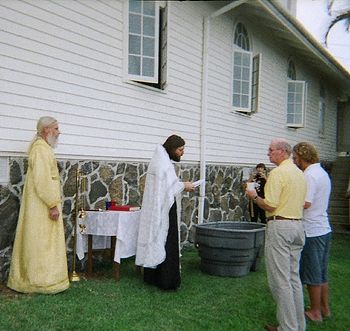
Theophany, 2009 .
There are always people who think we should do more, and people who think we should do less. Right now our regular schedule is Vespers on Saturday evenings, with Divine Liturgy on Sunday morning, and we have the feast days throughout the year. Of course, the Holy week schedule is different from everything, with many services throughout the week. We have some challenges here. I would love at some point to have a real community here, for people to be closer, and to have our own church. It would be nice to have more regular services other than just the Vespers and Liturgy. We do have classes on Thursdays or Saturdays. People come, and I encourage honest questions. We have a meal after the services.
—It is unusual in Russia to have a parish meal after services.
Yes; I heard a story about the visit of Patriarch Alexey II to America. He said that he was so impressed by the American coffee hour!
I think that this is important as a sort of agape meal, a continuation of the Eucharist. It is an extension of our liturgical fellowship, when we can spend time with each other. If we are going to love each other and live the Christian life together, we have to get to know each other. It also provides a time for the priest to talk with his people, outside of confession. It is also for the sake of visitors. An important part of our ministry here is hospitality, just welcoming the travelers here in Hawaii—people from any background. People need to have the space to feel invited, the space to explore, to look around; because Orthodoxy is so strange to many of them. It takes courage for people who are not Orthodox just to come in, because it is so different from what they know.
—How often do your parishioners go to confession?
It varies. The older practice was: confession and communion once a year—it’s in the bylaws! The norm for the OCA was four times a year, during the fast periods, but now I think there is a trend to make it a norm at once a month. Some people come more than once a month, perhaps every couple of weeks, while others come less frequently. I tend to give people space as long as I know that they can have some space. There are times when I say: I want you to come to confession, if you are coming to Communion. But there are times when I don't say that. Fr. Alexander Elchaninov said that pastoral work is always individual and creative. Also, there is a challenge with our island—it is the largest island in United States. People come to church from all over the island. Today we have a family from Hilo, on the other side of the island, and we always have people from Wimea and Haudansaa; people really drive far. But we have a gift here: the people that are here really want to be here. We don't have cultural Orthodoxy. People who are seeking cultural Orthodoxy do not need to come here anyway, because we are not good cultural center. But if they come, it is because they want the church. The character of the church is a little bit different. When you see someone who has driven three hours in the morning to get here, you can see the strength of their faith, and that is a gift for the pastor.
—Do you have any services outside of the church?
On the feast of Theophany we bless the ocean. Normally the Great Blessing of the Waters is done in fresh water, but we have no fresh water, no streams, or lakes—so we bless the ocean. One might say that it is rather ambitious of us to bless the Pacific Ocean, but our God is Great God, and He can do it! Once when we were saying the prayers before blessing, there was a Hawaiian man nearby catching fish. He kept catching more and more fish, and finally said “Thank you!”
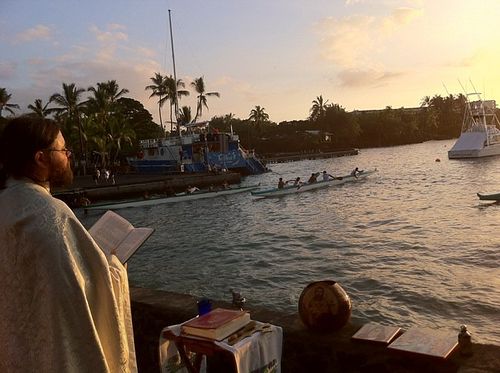 |
| The Blessing of the Waters of the Pacific Ocean on Theophany. |
—I understand that you originally came here for two months?
When I first came here it was on a temporary basis, on loan from the diocese, just to fill in. But right away I saw the faith of the people here. I love Hawaii, it is beautiful; but when I saw the faith of the people here, I thought, I can't leave, I’m not allowed to leave. It seems to be the right thing. I also love the local culture. It is close to Asia, and makes me think a lot about Asian missions. I think there are challenges in Polynesia and throughout Asia similar to what we have in America—various debates over canons and things. The debate sometimes comes up over ecumenism, but I can only answer that in America we by necessity live and breathe in that water. In our environment, we are constantly dealing with other churches—Protestant and Catholic especially. In this context, we have something wonderful to offer: Orthodox mission doesn't happen by condemning all that others have ever known as good. I think we must start by affirming anything good we can, and then show the richness of our faith, our heritage, and our spiritual tradition. The Orthodox Faith offers things that are psychologically and spiritually healing for America.
